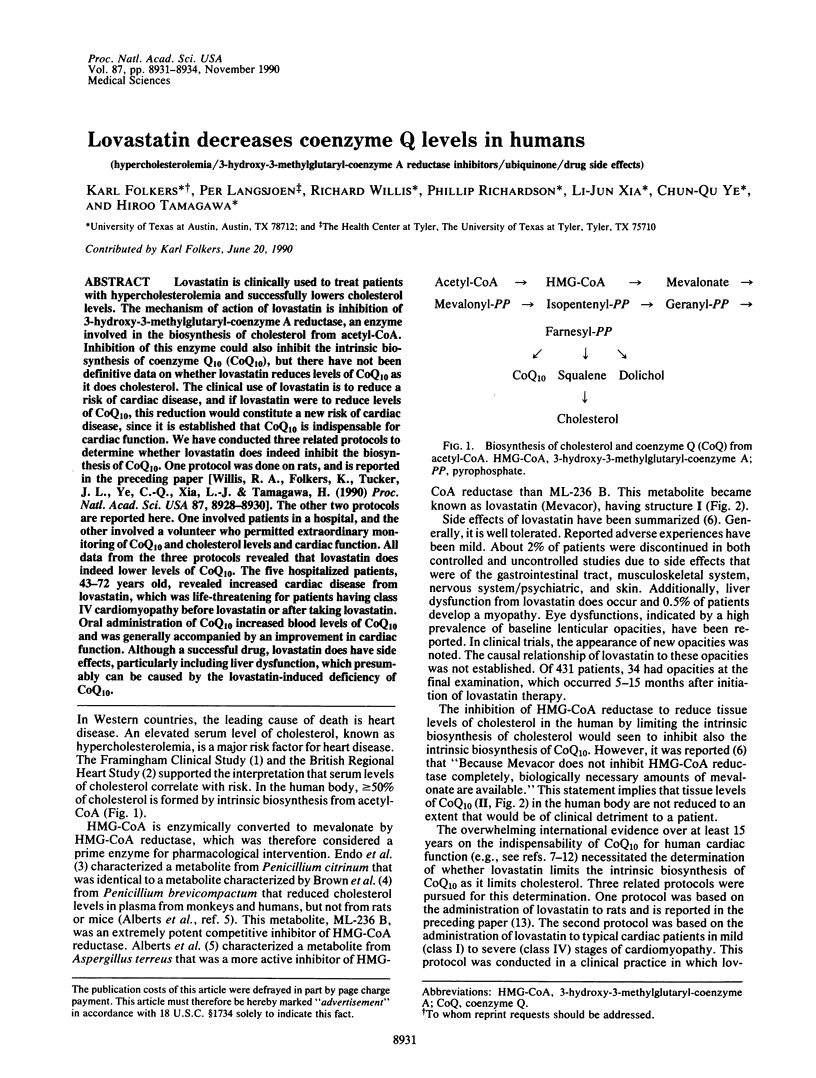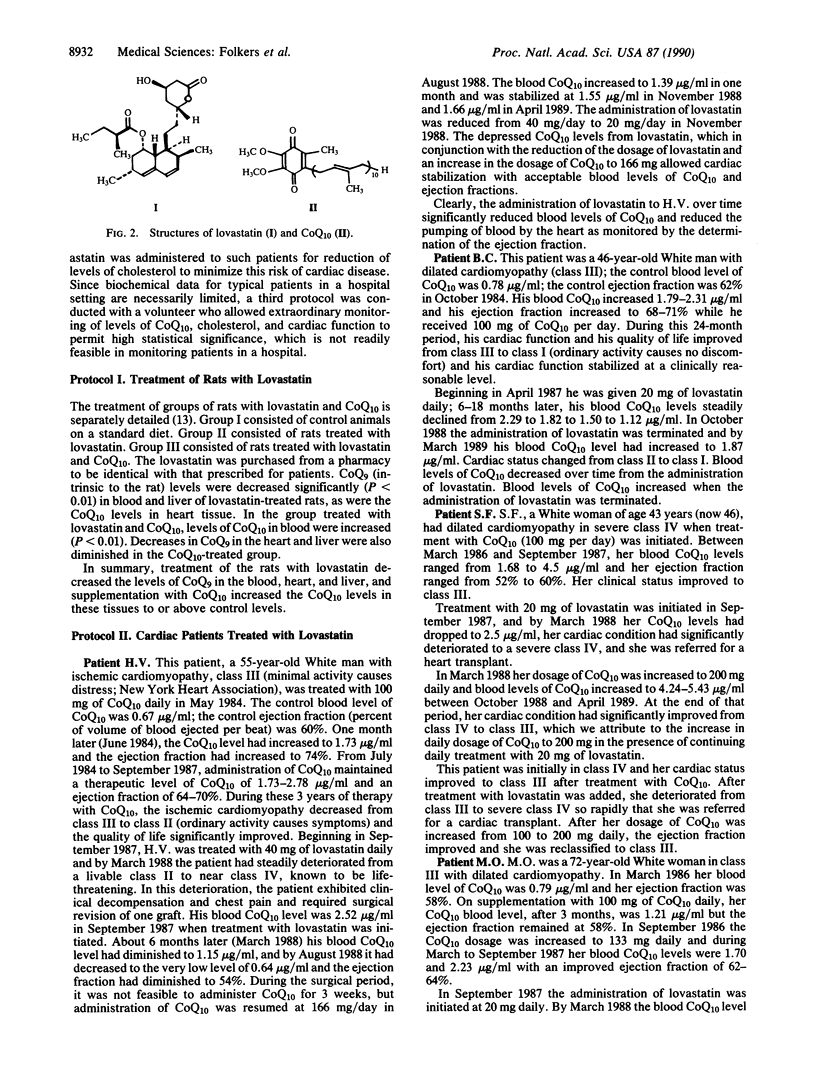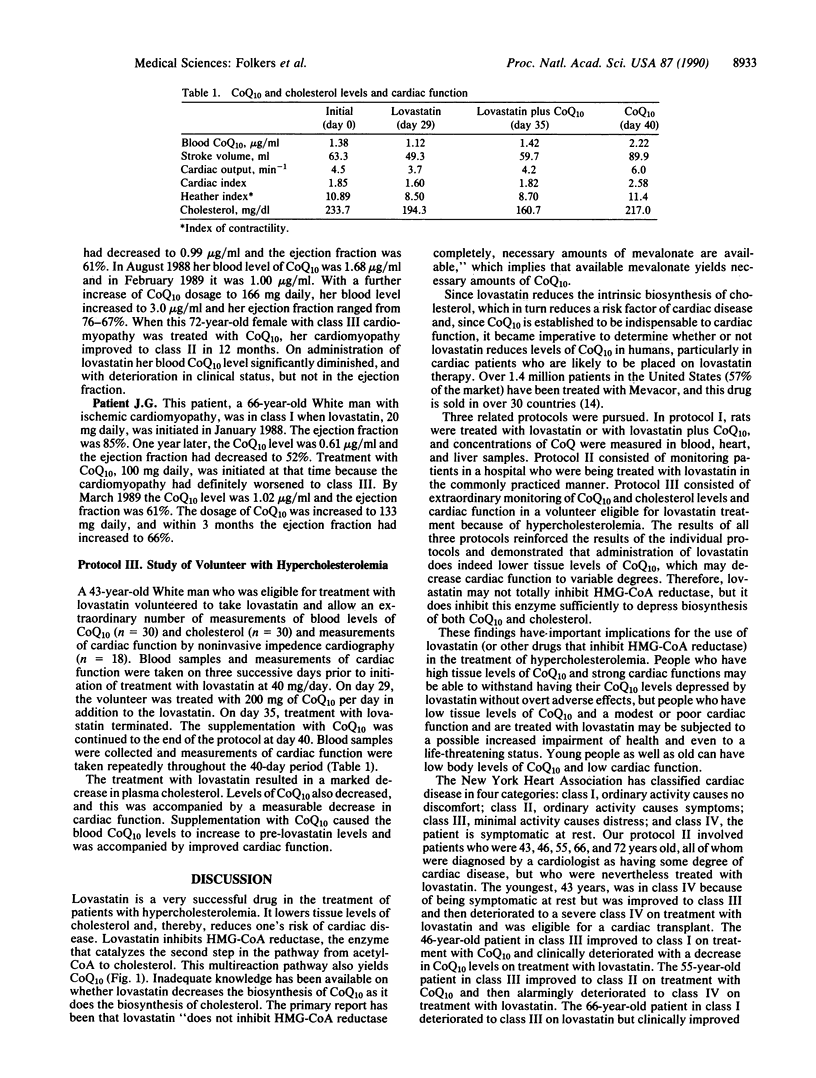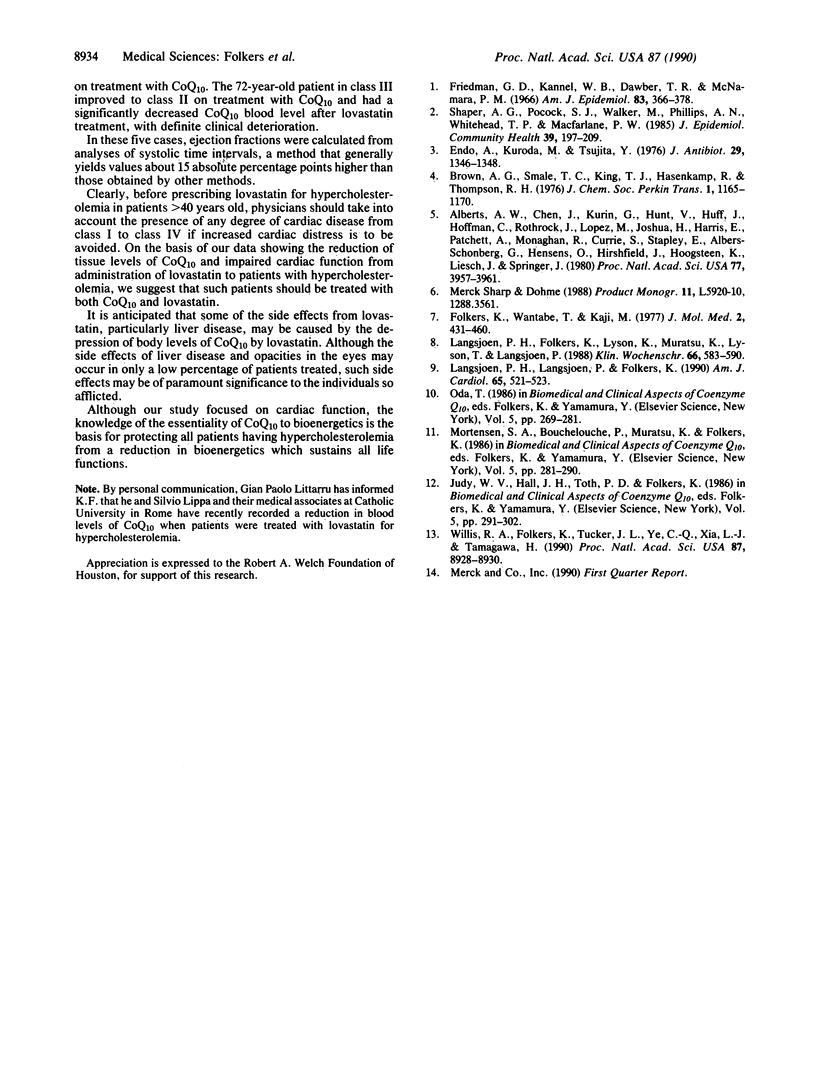Abstract
Lovastatin is clinically used to treat patients with hypercholesterolemia and successfully lowers cholesterol levels. The mechanism of action of lovastatin is inhibition of 3-hydroxy-3-methylglutaryl-coenzyme A reductase, an enzyme involved in the biosynthesis of cholesterol from acetyl-CoA. Inhibition of this enzyme could also inhibit the intrinsic biosynthesis of coenzyme Q10 (CoQ10), but there have not been definitive data on whether lovastatin reduces levels of CoQ10 as it does cholesterol. The clinical use of lovastatin is to reduce a risk of cardiac disease, and if lovastatin were to reduce levels of CoQ10, this reduction would constitute a new risk of cardiac disease, since it is established that CoQ10 is indispensable for cardiac function. We have conducted three related protocols to determine whether lovastatin does indeed inhibit the biosynthesis of CoQ10. One protocol was done on rats, and is reported in the preceding paper [Willis, R. A., Folkers, K., Tucker, J. L., Ye, C.-Q., Xia, L.-J. & Tamagawa, H. (1990) Proc. Natl. Acad. Sci. USA 87, 8928-8930]. The other two protocols are reported here. One involved patients in a hospital, and the other involved a volunteer who permitted extraordinary monitoring of CoQ10 and cholesterol levels and cardiac function. All data from the three protocols revealed that lovastatin does indeed lower levels of CoQ10. The five hospitalized patients, 43-72 years old, revealed increased cardiac disease from lovastatin, which was life-threatening for patients having class IV cardiomyopathy before lovastatin or after taking lovastatin. Oral administration of CoQ10 increased blood levels of CoQ10 and was generally accompanied by an improvement in cardiac function. Although a successful drug, lovastatin does have side effects, particularly including liver dysfunction, which presumably can be caused by the lovastatin-induced deficiency of CoQ10.
Full text
PDF



Selected References
These references are in PubMed. This may not be the complete list of references from this article.
- Alberts A. W., Chen J., Kuron G., Hunt V., Huff J., Hoffman C., Rothrock J., Lopez M., Joshua H., Harris E. Mevinolin: a highly potent competitive inhibitor of hydroxymethylglutaryl-coenzyme A reductase and a cholesterol-lowering agent. Proc Natl Acad Sci U S A. 1980 Jul;77(7):3957–3961. doi: 10.1073/pnas.77.7.3957. [DOI] [PMC free article] [PubMed] [Google Scholar]
- Brown A. G., Smale T. C., King T. J., Hasenkamp R., Thompson R. H. Crystal and molecular structure of compactin, a new antifungal metabolite from Penicillium brevicompactum. J Chem Soc Perkin 1. 1976;(11):1165–1170. [PubMed] [Google Scholar]
- Endo A., Kuroda M., Tsujita Y. ML-236A, ML-236B, and ML-236C, new inhibitors of cholesterogenesis produced by Penicillium citrinium. J Antibiot (Tokyo) 1976 Dec;29(12):1346–1348. doi: 10.7164/antibiotics.29.1346. [DOI] [PubMed] [Google Scholar]
- Friedman G. D., Kannel W. B., Dawber T. R., McNamara P. M. Comparison of prevalence, case history and incidence data in assessing the potency of risk factors in coronary heart disease. Am J Epidemiol. 1966 Mar;83(2):366–378. doi: 10.1093/oxfordjournals.aje.a120592. [DOI] [PubMed] [Google Scholar]
- Langsjoen P. H., Folkers K., Lyson K., Muratsu K., Lyson T., Langsjoen P. Effective and safe therapy with coenzyme Q10 for cardiomyopathy. Klin Wochenschr. 1988 Jul 1;66(13):583–590. doi: 10.1007/BF01720833. [DOI] [PubMed] [Google Scholar]
- Langsjoen P. H., Langsjoen P. H., Folkers K. Long-term efficacy and safety of coenzyme Q10 therapy for idiopathic dilated cardiomyopathy. Am J Cardiol. 1990 Feb 15;65(7):521–523. doi: 10.1016/0002-9149(90)90824-k. [DOI] [PubMed] [Google Scholar]
- Shaper A. G., Pocock S. J., Walker M., Phillips A. N., Whitehead T. P., Macfarlane P. W. Risk factors for ischaemic heart disease: the prospective phase of the British Regional Heart Study. J Epidemiol Community Health. 1985 Sep;39(3):197–209. doi: 10.1136/jech.39.3.197. [DOI] [PMC free article] [PubMed] [Google Scholar]
- Willis R. A., Folkers K., Tucker J. L., Ye C. Q., Xia L. J., Tamagawa H. Lovastatin decreases coenzyme Q levels in rats. Proc Natl Acad Sci U S A. 1990 Nov;87(22):8928–8930. doi: 10.1073/pnas.87.22.8928. [DOI] [PMC free article] [PubMed] [Google Scholar]


